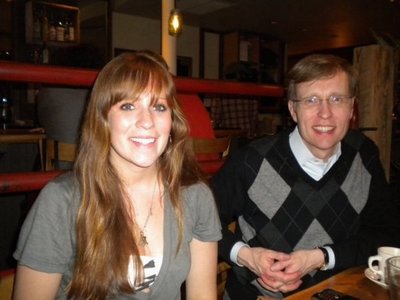March 4, 2010
UW Honors Program to launch new curriculum including interdisciplinary honors
When Rob McKenna arrived at the UW in 1980, he joined the University Honors Program. Years later as Washington attorney general, he’s said Honors strongly influenced his time at the University and well afterward.
His daughter, Madeleine McKenna, is now in Honors, majoring in economics and international studies like her father, but the program is considerably different from the one he knew.
And starting next fall, Honors will launch an updated curriculum that aims at a broader group of students, focuses on interdisciplinary studies and challenges students to connect classroom learning with structured experiences beyond.
“We want Honors students to make a habit of thinking within and beyond disciplines,” said Jim Clauss, a classics professor and director of the Honors Program.
The program will also offer three degree designations instead of two.
For the College Honors designation, students will take enhanced General Education classes beginning freshman year, followed by Departmental Honors courses in their majors. No changes in the program.
For Departmental Honors, students will take advanced courses in their majors, typically leading to a thesis or research project. Again, no changes.
The new designation, Interdisciplinary Honors, allows students to take the enhanced General Education courses but does not require ones in Departmental Honors.
Students in College and Interdisciplinary Honors will participate in at least two experiential learning projects in research, leadership, service or international study. To help connect experiences inside and outside the classroom, each Honors student will assemble a portfolio of reflections beginning his or her first year in the program.
In 2009, there were 983 students in College Honors. They constituted 3.6 percent of the 27,300 undergraduates at the University.
Also, there were 531 students, 1.9 percent of undergraduates, enrolled in Departmental Honors.
This past year, more than 2,600 students applied to the Honors Program; 704 of them, or 27 percent, were accepted in order to reach a target of 225.
When Rob McKenna was in Honors, the curriculum was Eurocentric: core courses covered key ideas of western civilization from Plato to Freud.
“It deepened my appreciation of western civilization and helped me with economics and political economy because I understood the framework, the backdrop,” McKenna said. “I also made a whole lot of friends in Honors, and frankly, that’s a big part of college. I met my chief of staff, Randy Pepple, my first day in Honors.” The program was small enough, McKenna added, that its members formed a community.
The courses Madeleine McKenna has taken reflect a more globalized world. Her senior thesis is on tourism and the informal economy in the Dominican Republic.
“I’ve really been shaped by my experience in Departmental Honors in international studies,” she said. “It has really stretched my intellectual abilities and taught me how to do in-depth research and organize a lengthy argument — 60 to 80 pages.”
Honors is also more robust than when founded in 1961. Along with more courses, it offers dorm space for Honors students; study abroad programs in Europe, Africa, and South America; experiential spring break trips; student clubs; and chances for leadership.
Clauss said new applicants will be evaluated holistically as in the past, but will also be asked how willing they are to take academic risks — whether they’d shift gears, put everything on hold, to pursue a subject that captures their imagination and sense of wonder.
“We hope that once students in the College or Interdisciplinary Honors Programs turn to their majors full-time, whether or not they are in Departmental Honors, they will have learned to connect the many and various dots and be ready to bring to their work, in school and beyond, a willingness to explore many approaches and all possibilities,” Clauss said.



